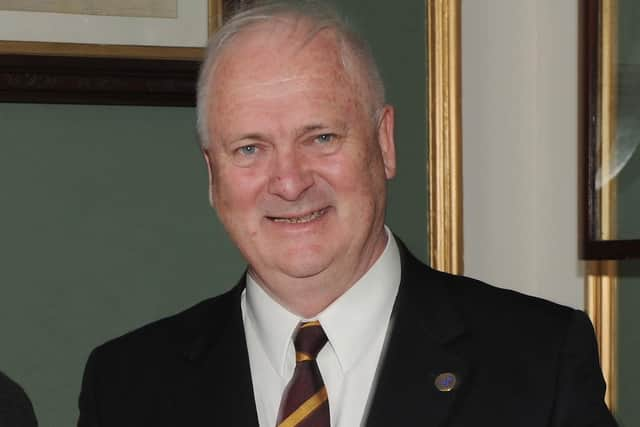John Bruton: Advocates of a united Ireland are not putting forward concrete ideas to persuade unionists to their goal


Those pressing for an early border poll on Irish unity, which would have to take place in both parts of Ireland, should reflect on this.
Such a poll could repeat the error of 1920 and add to divisions, rather than diminish them.
Advertisement
Hide AdAdvertisement
Hide AdI was a bit surprised then to see Bertie Ahern, former Taoiseach, call for the border polls to take place in 2028 (the 30th anniversary of the Good Friday Agreement).


He knows how fraught things could become.
Setting target dates, without having first done all the groundwork and collected all the data, can lead to unintended consequences.
Target dates tend to be misinterpreted as promises, and a sense of inevitability takes over, and rational discussion of the risks becomes impossible.
This is what happened with the 2016 UK referendum on Brexit.
Advertisement
Hide AdAdvertisement
Hide AdReducing a complex issue, with many nuances and gradations, to an over simplified Yes/No question is hazardous in itself.
Setting target dates for a referendum, before any details have been worked out, is even more reckless.
As the Brexit experience in 2016 has shown, it can also lead to the oppression of minority view points, lasting division, and to unforeseen consequences.
For these reasons, I was also surprised to see Sinn Fein spending large sums in advertisements in the United States, calling for early referenda on Irish unity, without reference to the lessons we have all learned from the Brexit referendum.
Advertisement
Hide AdAdvertisement
Hide Ad• A simple majority poll may be legal, but is it wise at this stage?
The Good Friday Agreement (GFA) does indeed provide for such a poll to be called, on the basis of a political judgement by the UK government that a majority in Northern Ireland would vote for Irish unity.
But it does not require the UK government to consult with the Irish government before calling such a poll, even though a poll on the same subject would have to take place in Ireland too, probably on the same day, and the effects of the polls would be felt across the whole island! This omission suggests to me that the provisions for border polls in the GFA were not properly thought through by the negotiators at the time.
Even though all other legislative decisions in Northern Ireland must, under the GFA, be agreed by a procedure of parallel consent of both nationalists and unionists, this, seminal and possibly irrevocable, decision to change sovereign status is to be taken for Northern Ireland, by a simple majority of just one vote in a referendum.
Advertisement
Hide AdAdvertisement
Hide AdThere is no room left for negotiation on that in GFA. As the polls north and south are to take place “concurrently” (probably that means on the same day) , there is little time for reflection. A fait accompli will be created over night.
As Seamus Mallon recognised, this is a recipe for trouble.
The notion of deciding to enforce Irish unity on the basis of a 51%/49% vote sits uncomfortably beside the principles in the Downing Street Declaration of 1993, agreed by Albert Reynolds and John Major.
That Declaration is the foundation on which the GFA, and the entire peace process, was built by the two governments.
The wise words of the Downing Street Declaration should influence both
whether , and when, a border should take place, and
Advertisement
Hide AdAdvertisement
Hide Adhow voters in both parts of Ireland should vote, if such a poll is eventually called.
The Downing Street Declaration says that Irish unity should be achieved
“by those who favour it, persuading those who do not, peacefully and without coercion or violence”
I do not think a poll in favour of unity, carried by a small margin, and before a majority of the unionist community have been persuaded of the merits of Irish unity, could truly be said to meet that criterion agreed between the governments.
It might be legally valid, but not politically wise.
Advertisement
Hide AdAdvertisement
Hide AdThere is little evidence that this type of persuasion is taking place within Northern Ireland between the two communities. In some senses they are more polarised than ever, and are talking past one another rather than with one another.
For example, the Sinn Fein advertisements advancing arguments for unity should have been in the Belfast Telegraph or the News Letter, rather than in the New York Times!
It is the unionists, not Americans, who need to be persuaded.
I do not see much evidence that those, who say they want an early border poll, are putting forward concrete ideas to persuade unionists to cease to be British unionist, and instead embrace Irish unity.
Advertisement
Hide AdAdvertisement
Hide AdWhat have nationalists said to them so far, that would show them how their British heritage and ethos would be respected in a united Ireland?
• The goal must be stability
In the Downing Street Declaration in 1993, the Taoiseach, Albert Reynolds said on behalf of the Irish people
“Stability will not be found under any system which is refused allegiance, or rejected on grounds of identity, by a significant minority of those governed by it”.
This was a humane and realistic statement.
I do not think a poll on unity, carried by a narrow majority of say 51% to 49%, could be guaranteed to deliver a system that would not be “at risk of being rejected, on grounds of identity, by a significant minority”.
Advertisement
Hide AdAdvertisement
Hide AdIf it were passed on that basis, there would not be much stability afterwards.
• Unionist aspirations would still have to be respected after any poll
It is also important to recognise that the GFA itself says that, regardless of the constitutional status of Northern Ireland, there must be
“full respect for , and just and equal treatment for, the identity, ethos, and aspirations of both communities”
Advertisement
Hide AdAdvertisement
Hide AdThose who favour a border poll have an obligation to spell out exactly how the British identity, and monarchist ethos, of the unionist population might given the required “equal treatment and respect”, across the whole island in the wake of Irish unity.
This will not be easy. Some of the changes required might go against public opinion here.
The recent furore about commemorating the dead of the RIC, 100 years after they were killed, is a foretaste of the sort of resistance that might be encountered. Symbols can be very divisive.
There could also be implications for levels of domestic taxation here, as the UK subsidy to public services in Northern Ireland at present, comes to 20% of GDP there.
Advertisement
Hide AdAdvertisement
Hide AdIt is also important to stress that a border poll in favour of unity in both jurisdictions might not necessarily settle the constitutional issue finally, especially if the margin was narrow.
Paragraph (v) of the GFA will oblige the government of a united Ireland to continue to respect the “aspirations” of the unionist community, in what was Northern Ireland. It is quite likely that, in certain areas, large local majorities would continue to “aspire” to rejoin the UK. North Armagh, East Belfast, Antrim and many other places come to mind.
Even if such a continuing existence of such an aspiration did not pose a security risk, it is an aspiration that the authorities would, in any event, be obliged to respect under paragraph (v) Good Friday Agreement.
On the face of it, this is not a recipe for stability.
• Is there a better way?
I believe the focus now should instead be on making all the three strands of the Good Friday Agreement yield their full potential, rather than fixating on territorial sovereignty through a border poll.
Advertisement
Hide AdAdvertisement
Hide AdPersonally, I would like to see Irish unity, but we must first build sustained reconciliation, and shared goals, between the two communities in Northern Ireland. That is a commonsense precondition for success.
The voters of the South of Ireland, who would also have to vote in a poll on Irish unity, would have to ask themselves, before they vote, if the criteria for Irish unity, set out on their behalf by Albert Reynolds in the Downing Street Declaration of 1993, will have been met, or are likely to be met as a result of the poll.
Voters ought not just ask themselves what they would like to happen, but what would be likely to happen, if Irish unity was carried by a narrow 51/49 vote and there was a large unhappy minority who felt they were being over ruled.
That will be a heavy responsibility.
Voters would also have to ask themselves if they are ready to take on the financial responsibilities that would flow from their decision on unity.
Advertisement
Hide AdAdvertisement
Hide AdDublin would have to take over the net subvention to support the Northern Ireland budget that currently is met by London. It comes to a large figure, which would be larger still , if salaries and welfare rates in Northern Ireland had to be brought up to levels south of the border.
There are also issues of the national debt and pensions.
The net costs in increased taxation in the south of Ireland, although substantial, need not be an obstacle to unity, so long as people in the south know about them in advance, and can make an informed decision.
Let us think this thing through, and avoid precipitate commitments to dates for referendums, before every angle has been figured out.
• John Bruton is a former leader of Fine Gael and Taoiseach
——— ———
A message from the Editor:
Thank you for reading this story on our website. While I have your attention, I also have an important request to make of you.
Advertisement
Hide AdAdvertisement
Hide AdWith the coronavirus lockdown having a major impact on many of our advertisers — and consequently the revenue we receive — we are more reliant than ever on you taking out a digital subscription.
Subscribe to newsletter.co.uk and enjoy unlimited access to the best Northern Ireland and UK news and information online and on our app. With a digital subscription, you can read more than 5 articles, see fewer ads, enjoy faster load times, and get access to exclusive newsletters and content. Visit https://www.newsletter.co.uk/subscriptions now to sign up.
Our journalism costs money and we rely on advertising, print and digital revenues to help to support them. By supporting us, we are able to support you in providing trusted, fact-checked content for this website.
Alistair Bushe
Editor